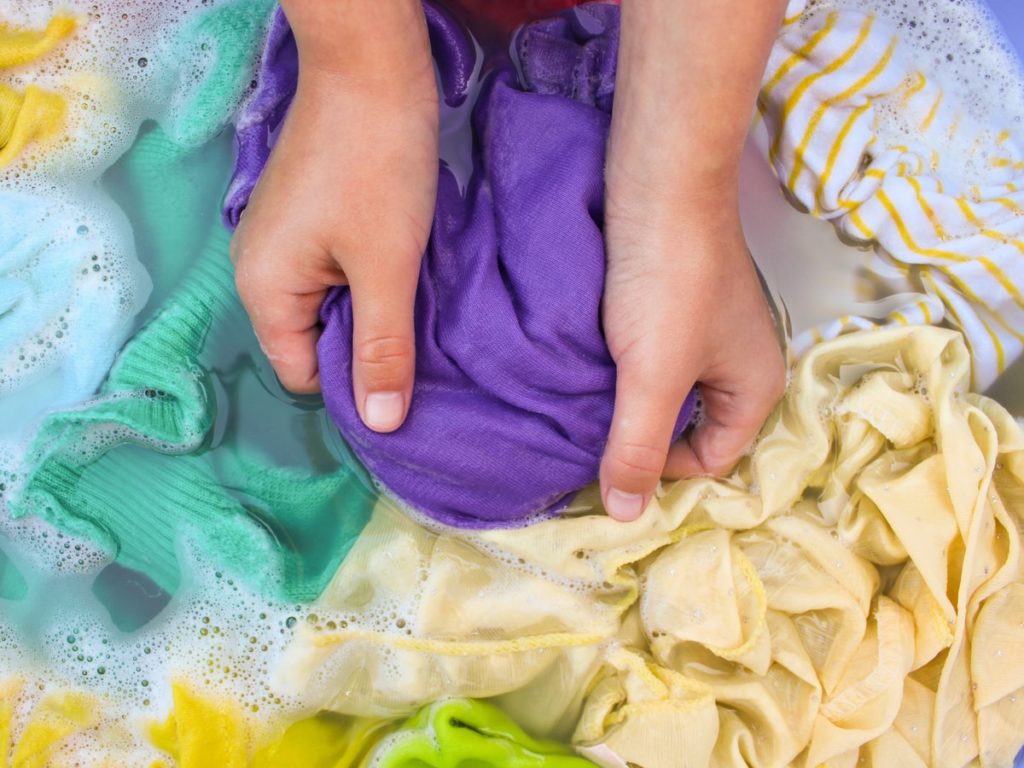Has anyone ever mentioned how good you look in royal blue? No need to act overly modest—we all have colors that suit us best. For example, at Rent-A-Center we happen to look our best in blue, yellow, and crimson! And we know that wearing faded clothes stinks, no matter how fresh they smell. So, we’re publishing our go-to guide for how to wash colored clothes, along with tips for making laundry day easier.
7 Tips for Washing Colored Clothes
Before you abandon bright-colored tops and skirts for good, try out these easy color-care tips.
1. Follow directions.
Remember that summer when your dad refused to ask for directions, and you spent more time in the car than in line for your favorite roller coaster? Don’t be like dear old dad. Read your clothes care labels.
Follow directions to hand wash, use a certain temperature of water, or dry on a specific setting. Following these instructions will do more than keep colors from fading. It can also reduce the chance of fabric shrinking, pilling, and stretching!
2. Don’t get cold feet about cool temperatures.
Whether your clothes label says to hand wash or machine wash, you’re almost always better off using cold water if you want to keep colors from fading. For certain fabrics such as wool, hot water causes fibers to lengthen which releases dyes—fading some clothes and staining others!
Be especially careful with new clothes. Since they’ve been dyed more recently, they’re more likely to release extra color on their first spin in the washing machine.
If you’re concerned about cold water not doing the trick on stains and smells, double-check that your detergent is cool water-friendly. Also, pretreat dirty and stinky spots for an efficient wash that doubles as a colorfastness test.
3. Let there be light! And dark—in separate loads.
Even if you use cold water, there’s still a chance some clothes will bleed and “paint” your whites. Add another layer of protection by taking the time to separate light and dark colors. Doing so will help keep both your white nightgown and your black slacks brighter in the long run. Plus, if you’ve got a toddler who’s not quite ready to help out with chores, having them sort laundry with you is a great way to ease them into a lifetime of laundry.
If your family’s dark clothes have outgrown your washing machine, you may have the wrong machine size! Think that may be the case? Before you upgrade, read up on how to select the best washer dryer size for your needs.
4. Don’t crank up the soil settings.
Unless you’re washing your sporty teenager’s entire wardrobe, try and hold off on the “heavy” setting of your washer’s dial. Most of the times, it’s not necessary and avoiding it can help save your clothes, your wallet, and the planet.
If your washer dial doesn’t have a “heavy” setting, the “bulky” or “high soil” option may offer a similar washing process. All of these cycle selections tend to wash clothes by pre-soaking them and then agitating and spinning them at high-speeds—which may result in runny dyes and pilling.
If your current laundry machine doesn’t offer the optimal settings for your situation, learn how to shop for a washer and dryer before your next upgrade.
5. Add a half cup of salt or vinegar.
After a week’s worth of workouts, your new pink sweatshirt no longer smells like the department store. You don’t want to walk around in a smelly sweatshirt, but how do you wash such a brilliant color without fading it?
If you suspect a bright or dark colored item you’ve recently purchased may “bleed” in the washing machine, try soaking it in water with a half cup of salt or white vinegar before its first wash.
Soak each item individually for up to 20 minutes, checking for bleeding at five-minute intervals. If the color runs, refrain from putting the item in the washer and hand clean it instead. If the color stays, follow the directions on the care label before you wash it. Just don’t try this method on dry clean only clothes, as the colors will run!
Fun fact: In craft dyeing, salt and vinegar are known as mordants—ingredients used to fix the dye within the fabric fibers.
6. Try color-catching sheets.
Some days, running separate loads of darks and lights is just not feasible. Although we strongly advocate for sorting clothes by color, you can use color-catching sheets when you need to get everything washed in one cycle.
Color catchers look a lot like dryer sheets and can be found in the detergent aisle of most supermarkets. According to The Guardian, color catching sheets contain positively charged compounds that attract negatively charged dyes used to give clothes their color. If an item bleeds causing its dye and the sheet to meet, a chemical bond forms and prevents other clothes from staining. The best part is, once you take your laundry out of the washer, you will be able to clearly see how much color transferred from your dark items to the sheet!
It’s important to note that color catchers won’t prevent clothes from fading since the dye is still going to run, but they can help prevent dark clothes from spotting light ones.
7. Consider an upgrade.
Outdated laundry machines can be rough on fabrics and inefficient at getting the job done. Older machines were engineered for lifestyles and clothes that were fundamentally different from what we do and wear today. So, if you’re searching online for “how to keep colors from fading,” you may soon find yourself in the market for a new washer and dryer set. Your local Rent-A-Center has affordable rent-to-own appliances from brands you know and love. Shop Amana, Whirlpool, and even Maytag washers and dryers at a store near you.

